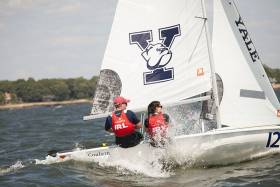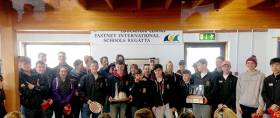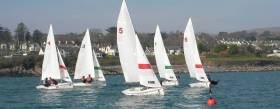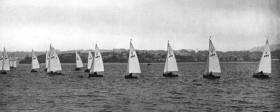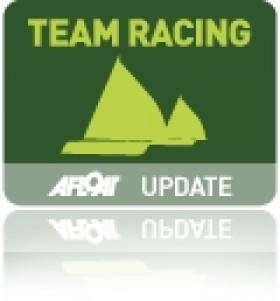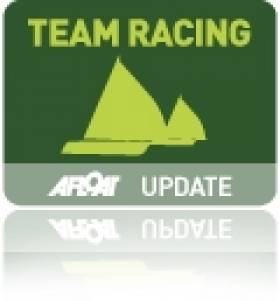Displaying items by tag: Team Racing
Dublin University Sailing Club Prepare for Collegiate Cup
Dublin University Sailing Club (DUSC) team will represent Ireland this summer at the Laser Performance Collegiate Cup (LPCC), an international team racing events to be held in Lake Garda, Italy. The event, hosted in 2015 by Yale Corinthian Yacht Club in Connecticut and won by the USA Women’s team, attracts college sailors from all around the globe and is raced in Z420 dinghies. Last year’s competition saw eight teams from seven countries compete, including representation from Oman and Japan.
Last year’s Irish team contained four Trinity sailors, one UCD sailor and one sailor from UCC. 2016 will see a full team of six sailors and two subs from Trinity representing Ireland.
Those who will travel to Lake Garda are 2012 London Olympian Scott Flanigan, Lucy Bolger, Dan Gill, Lindsey Watters, Mark Bolger, Maeve Lavelle, Dan O’Beirne, and Charlotte Bowen.
The event takes place from 23-27th August.
Dublin University Sailing Club, more commonly known as Trinity Sailing, is the largest student sailing club in Ireland with over 200 active members, 75 of whom compete regularly.
The International Schools Team Racing Championships sailed in Schull, West Cork at the weekend was a huge success, with the event being the first time this number of schools from the United States, England and Ireland had competed together in Team Racing.
15 teams sailed in ideal conditions; winter switched off and summer switched on.
The event was tightly fought for between Schull Sharks and Presentation Brothers Cork from Munster and Tabor Academy and Cape Cod Academy from the United States, all taking races from each other.
The final outcome was not known until the second last race, when Cape Cod Academy lost to Tonbridge college from the UK allowing PBC through as the overall winners.
1st PBC (Ireland)
2nd Cape Cod (USA)
3rd Tabor Academy (USA)
4th Schull Sharks (Ireland)
5th International (Ireland & USA)
6th Tonbridge college (England)
USA Crews Line Up for Inaugural International Schools Team Racing Championships in Schull
The inaugural International Schools Team Racing Championships will take place in Schull, West Cork from the 18th –20th March.
16 teams are entered, with Tabor Academy and Cape Cod Academy sending four teams from the USA arriving on the 16th, in time to take part in the Schull St Patricks Day parade with the Schull teams.
The international event has developed from Schull Sailing Teams traveling every two years since 2007 to visit US schools in the New England area, hopefully this will be a biennial event.
Four teams are coming from the UK, including Sevenoaks, Tonbridge, James Alexander Gordon and Burford schools.
The American schools are doing home stay with the Schull sailors.
Eight teams are entered from Ireland, mainly from Munster with one team from the RstGYC.
Firefly Dinghy Celebrates 70th Birthday
The dinghy synonmous with team racing in Ireland (and also early Olympic Games endeavours) celebrates an important birthday this year and the UK class is making a special effort to push the boat out. Designed in 1938 by Uffa Fox, as a one design boat suitable for team racing, the 2016 season marks the 70th Anniversary of Firefly Class; the first boats came off the production line at Fairey Marine, Hamble, in 1946. It was originally requested by Oxford and Cambridge Universities, requiring a dinghy similar to the National 12, but more suitable for team racing.
The design was completed in 1939 just prior to hostilities that would put back any ideas of production for more than six years. After the War, the Fairey Aviation Company had the idea of manufacturing a dinghy using the principles that constructed so many wooden Mosquito aircraft fuselages during the war, with diagonal laminates formed on a mould and cured by electrically heated bands holding the laminate in position.
SELECTED FOR THE 1948 OLYMPIC GAMES
As the 1948 Olympics in Britain approached, there were very few dinghies available in numbers, but the Firefly could be built quickly and in volume, so was selected as the single handed sailing dinghy for the Games.
Throughout the years, the class has been popular with many Schools and Universities, both in the UK and overseas, where it is sailed in team racing events. Many students have experienced their first dinghy racing in a fleet of Fireflies.
Some of the most famous names in sailing have previously raced Fireflies, including Paul Elvstrom, Bruce Banks, Richard Creagh Osborne and Jack Holt As well as current and six times World Match Racing champion Ian Williams.
NOW ONE OF THE MOST POPULAR BOATS
With more than 4250 boats built (650 built by Rondar Raceboats) the Firefly is one of the UK’s most popular and successful classes. It has now also been sold successfully overseas with fleets in the USA and Canada.
Many have preconceptions of what Firefly you would need to win the Nationals, but history has proven that the original wooden hulls and GRP hulls from every era all have a chance of winning; there are no inequalities in hull performance, unlike some classes. And you can sail at whatever level you choose – no maintenance or classic restored varnished hulls.
FLEET AND TEAM RACING
The Firefly is well respected as the ideal dinghy for team racing, offering good equal performance, great manoeuvrability and capable of being sailed in all weather conditions; it's always a team racing contender in the Endeavour Trophy, finishing 4th last year.
Team racing takes place at University Sailing Clubs, numerous schools and associations up and down the country each weekend.
During 2015, the ISAF World Team Racing Championships was held in the UK with many overseas teams participating. The final, held in a fleet of new boats supplied by Rondar, was won by a team from the USA!
The UK Class Association also organise a programme of fleet racing each year with Open events, Regattas and a National Championship.
The 2016 National Championships will be held at this year at Tenby, 6-12 August and we are hoping for 100 boats!
To celebrate this historic milestone the class and suppliers have come together to prize draw a brand new complete boat as a prize. It will require entrants to “beg, steal or borrow” a boat and compete in any of the nominated events or qualifying via club races this season, to secure a ticket in the prize draw for a brand new Rondar boat. The more race entries equals more prize draw chances. Conditions apply so please get details of how to enter from the UK Firefly website: www.fireflyclass.co.uk
UCD 1 Victorious at IUSA Easterns in Kerry
The 24 teams from UCD, DCU, DIT, CIT, UCC, NUIG, Queens and Trinity were greeted with sunny blue skies as they arrive down to Dingle Sailing Club on Saturday morning the 17th of October to compete in the first day of the 2015 IUSA Easterns. The winds were light in the harbour and struggling to reach five knots. While the boats were being rigged, course being set and committee getting in position the breeze began to rise as if to welcome the sailors to the waters of Dingle.
The races got off to a slow start due to problems arising with the jury boats in the flooding tide, making areas of the course to shallow to sail in. Once these problems were remedied the races flew by. Locals and tourists looked on from the grass area as they were treated to watch very close racing. As the sun began to set and the temperatures dropped the committee called racing for the day after 61 tight races. At the end of the day the leaders of the gold, silver and bronze round robins were UCC1, UCD3 and UCD5 respectively.
An earlier first gun saw the teams on the water for 9:30am on Sunday morning and racing got underway immediately. The racing went straight into the quarterfinals with best of 3 matches for the gold and silver fleet and best of one for the bronze fleet. The finals were UCD1 versus CIT1 in the gold fleet, TCD3 versus TCD4 in the silver fleet, and TCD5 versus TCD6 in the bronze fleet with UCD1, TCD3 and TCD5 all coming out victorious.
Royal St. George Yacht Club in Dun Laoghaire will follow up its inaugural Elmo Trophy Team Racing trophy next month when the country's largest yacht club stages the Irish Team Racing Championships 2015 from 7th–8th November.
The event is for three boat teams and will be sailed in RSt.GYC supplied Firefly dinghies.
ISA Medals will be awarded to the first three Irish teams, and to the first Irish Youth team (subject to a minimum of three entries). In addition, the first Irish teams in each category may be selected to represent Ireland at any International team racing event in 2016.
More details downloadable below.
Irish University Sailing Team Sixth in Collegiate Cup Regatta
As students prepare to head back to school, the Irish Collegiate Sailing Team is celebrating recent success in one of it’s first U.S. regattas of the season; the Laser Performance Collegiate Cup, sailed in 420 dinghies last week.
The regatta, which kicked off on the 25th of August on Long Island Sound in Connecticut, USA, consisted of eight teams from around the world who all came to attend what is considered the first collegiate level international regatta with both team and fleet racing components. The regatta, organised by LaserPerformance and sponsored by FitAid and Redbull, was generously hosted by the Yale Corinthian Yacht Club, who provided the boats.
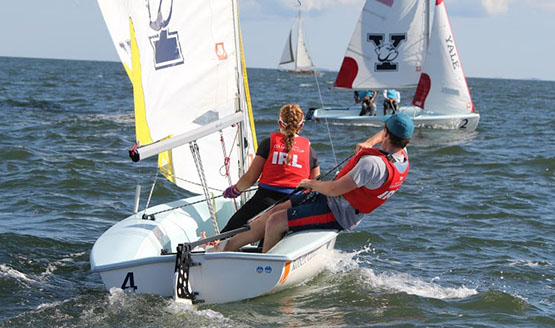
The first two days of the event were set aside as coached clinics so that the sailors could get used to the new boats and practice their team racing skills, a sector of competitive sailing that several of the sailors were experiencing for the first time. Among these coaches was Anna Tunnicliffe, four time U.S. Sailing’s Rolex Yachtswoman of the Year and 2008 Olympic Gold Medalist in the Laser Radial Class, among other titles. Irish sailor Caoimhe Tyndall commented, “Anna's professional instruction proved to be extremely beneficial, as each sailor noticeably improved as the regatta progressed…Anna provided the competitors with an immense amount of sailing knowledge.”
Both clinic days started out with 5-7 knots from the west and eventually shifted around to the south, building to 10-15 knots. The Irish Team felt that this was the perfect wind for team racing and were able to get some good quality races off, especially against the ever competitive Italians.
West Kirby Sailing Club narrowly beat the RSGYC Green of the home club 2-1 in the final to win the first Elmo team racing Trophy.
8 teams of under 18 sailors took part, quickly getting to grips with the equally matched fleet of firefly dinghies. Blue skies and fresh breezes on Saturday saw Storm sails fitted as the teams got into their strides.
The experienced and fast team from Schull set the early pace and dominated the first round robin where each team sailed 7 races.
Joining Schull in the Top four and thus into the Gold League were West Kirby and RSGYC GREEN and RSGYC RED. Just missing out and into Silver were Sutton Dinghy Club who were new to Fireflies and to team racing – more to come from them in the Future.

Elmo Trophy Winners
Sunday morning saw gentle breezes and a chance for the young flyers from Bray to post wins on the scoreboard. The weather co-operated all day and allowed the completion of a second round of Gold and Silver racing to be completed.
RSGYC Green won a three way tie to finish as top seeds for the Semi Final knock-outs. RSGYC RED and RSGYC Blue battled it out for the fourth seed with RSGYC RED emerging victorious.
The first Semi Finals saw West Kirby eliminate Schull 2-0 and RSGYC Green knocking out RSGYC RED by the same score. The final was closely fought with WKSC taking the first race only for RSGYC Green to stack the favoured pin in Race 2 and use their speed to sail off with a 1-2 victory. West Kirby showed their experience in the deciding race by dominating the pre-start and establishing a 1-2 combination at the first mark which they would never relinquish. Schull went back to West Cork with the consolation of third place after winning the petit final 2-0.
Special thanks go to the Race Team and Umpires whose efficiency saw each team sail at least 13 races over the weekend.
Final Results
1st West Kirby Sailing Club
Hollie Marston Tom James Ella Marston Henry Hughes Hannah Owen Alex Colquit
2nd RSGYC Green
Conor O'Beirne Molly Boyne Sean Donnelly Sarah Fogarty Patrick Cahill Emily Arrowsmith
3rd Schull
Isaac Mccarthy-Fisher Rosa Lyden Noah Mccarthy-Fisher Harry Durcan Florence Lyden Anna O'Regan
4th RSGYC Red
5th RSGYC Blue
6th Sutton Dinghy Club
7th Bray Sailing Club
8th National Yacht Club
Forum For Irish Team Racing Discussion Opens Online
#teamracingforum – News that the Optimist dinghy class in Ireland is once again organising a team racing event, together with the announcement of plans for junior event in the Royal St George and the continuing development of 2K team racing in Europe confirm that team racing offers competitive sailing for all ages. With this new impetus the Irish Team Racing Association have set up a forum to allow 'in depth discussion' of a large number of topics regarding team racing and its development in Ireland.
The forum is reserved for active participants in team racing organised by ITRA. Delegates from IUSA, the Irish National Schools Sailing Association will be invited to participate if they do not qualify for access directly. As membership of ITRA is one topic that needs to be addressed access to this forum is limited to sailors, race committee and umpires who took part in the ITRA Nationals in 2013 and 2014.
The forum registration process is here
RYA National Team Racing Championship Won By Hoosiers
#teamracing – The Royal Forth Hoosiers (Tim Saxton, Rob Friend, Mark Powell, Isobel Walker, George Clark, Holly Scott) were worthy winners of the RYA National Team Racing Championship hosted by the UK Team Racing Association and Rutland SC on 21/22 March.
24 of the best team racing teams from across the UK were competing at the event, including the recently selected GBR squad for the forthcoming ISAF Team Racing World Championship, which is also being hosted by Rutland SC in July.
The competition started in a fresh, force 4/5 breeze on Saturday, necessitating the use of cut down mainsails on the fleets of 12–foot Firefly dinghies.
The first stage of the Championship consisted of four, seeded leagues, each comprising six teams. After 60 races, the fleet was reclassified for the second stage into Gold, Silver and Bronze leagues of eight teams.
The Championship was decided on the results of the second stage races that had been sailed. The Hoosiers were convincing winners, having not lost a race throughout the competition, and were presented the Prince Philip Trophy.
The next major team racing competition will be the Wilson Trophy (the unofficial British Open Team Racing Championship), which is being hosted by the West Kirby SC on the Wirral, near Liverpool, on the 8-10 May 2015.
More here



























